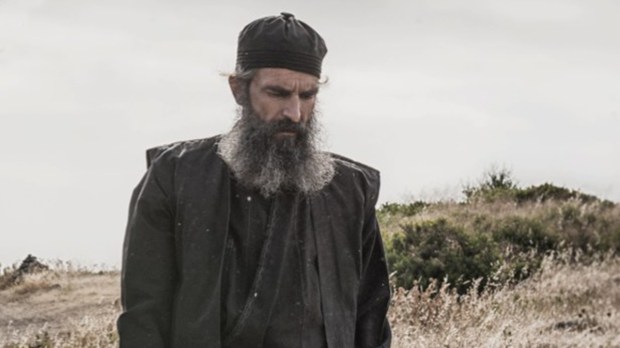There aren’t a lot of movies for Lent. For Easter, sure, no problem. Be it old standards like The Ten Commandments or newer classics like The Passion of the Christ, there are plenty of films to help put one in the proper mindset for Holy Week. But for the 40 days of prayer, fasting, and almsgiving leading up to Easter, there’s just not much to choose from, nothing that really captures the sense of asceticism that comes with the season. However, with her latest motion picture, Man of God, writer-director Yelena Popovic may have solved that problem.
Man of God is the story of a humble priest who would come to be venerated by the Eastern Orthodox Church as St. Nektarios of Aegina. However, though its tale is true, Man of God has no interest in being a simple checklist for events in Nektarios’ life. Eschewing the typical biopic formula, the film completely ignores his childhood and formative years, beginning instead with Nektarios already in his forties and serving as a bishop in Cairo. There, he stands falsely accused of embezzlement by his fellow bishops, who have grown jealous of the holy man’s popularity with the people.
This plot to defame the good bishop is just the start of a pattern of persecution that follows Nektarios throughout his life, be it his exile to Egypt for crimes he did not commit or the fabricated allegations of sexual misconduct that would arise after he founds a monastery for nuns on the island of Aegina. The film takes care to detail each and every one of these tribulations, but more importantly, it focuses on Nektarios’ response to them.
A good example is what happens while Nekatarios is teaching at the Rizarios Ecclesiastical School in Athens. As a test of sorts, he is presented with two students involved in a fight who have been brought before him to be disciplined. He listens patiently as the young men make their accusations against one another, their voices rising along with their tempers. The school’s president, who is also present in the room, demands to know what Nektarios is going to do about the situation. Staring thoughtfully at the boys for a moment, the bishop quietly admits that, yes, something must be done. “Therefore,” he says, “I am going to punish myself.”
Yes, himself. Under the assumption that had he set a better example for his students, they would never have fought in the first place, Nektarios demands that he be denied his meals for the next week. So enraged at this resolution is the school president, a very vocal secularist, that he threatens (again) to remove Nektarios from his position. But the effect Nektarios’ small act of self-denial has on his students is a profound one. Most engage in some form of self-reflection; some even begin to consider the priesthood.
These are the moments in Nektarios’s life that hold Man of God’s interest, these instances that accentuate his ascetic approach to spirituality, not as a means of mere self-flagellation, but as a positive effort with real world consequences, both for himself and those around him. Now, of course, as might be expected of someone seen as a saint by the second largest Christian communion in the world, Nektarios’s asceticism often goes beyond that of the common believer. The movie portrays Nektarios as someone whose self-denials extend even to the emotional spectrum, so much so that his only reaction to each of his trials is an utterly unemotional stoicism that makes Star Trek’s Mr. Spock seem downright overwrought by comparison.
Such extremes aren’t uncommon in the great ascetics, though. As Fr. Michael Rennier notes in his article on why we practice asceticism in Lent, “Some of the saints we know and love were highly accomplished ascetics and often took the practice to almost unimaginable extremes. St. Simeon the Stylite spent 37 years sitting on top of a pillar. St. Jerome would strike his chest with rocks. St. Thomas Becket would wear a rough garment known as a hair shirt that constantly irritated his skin.”
Obviously, the point is not to duplicate such feats. After all, in these hectic times, who has 37 spare years to sit on a post? But even the small self-sacrifices we are called upon to make during Lent can still have lasting positive effects, not just on ourselves, but potentially on those we interact with. This is the ultimate takeaway of Man of God, and what gives us (finally) a movie tailor made for the Lenten season.
Man of God plays in select theaters on Monday, March 21, and Monday, March 28.




